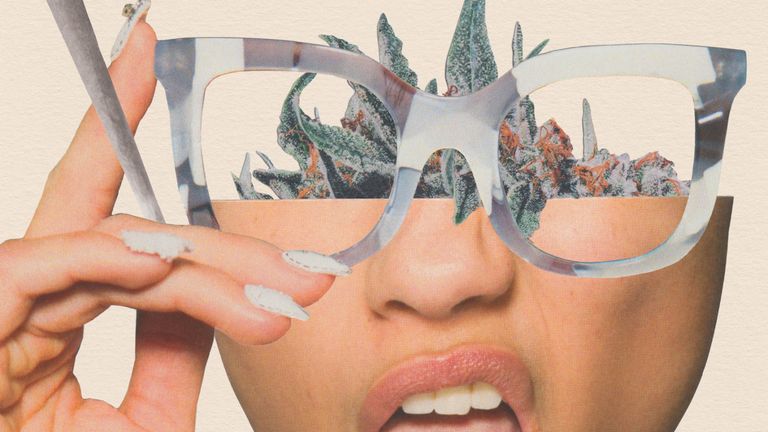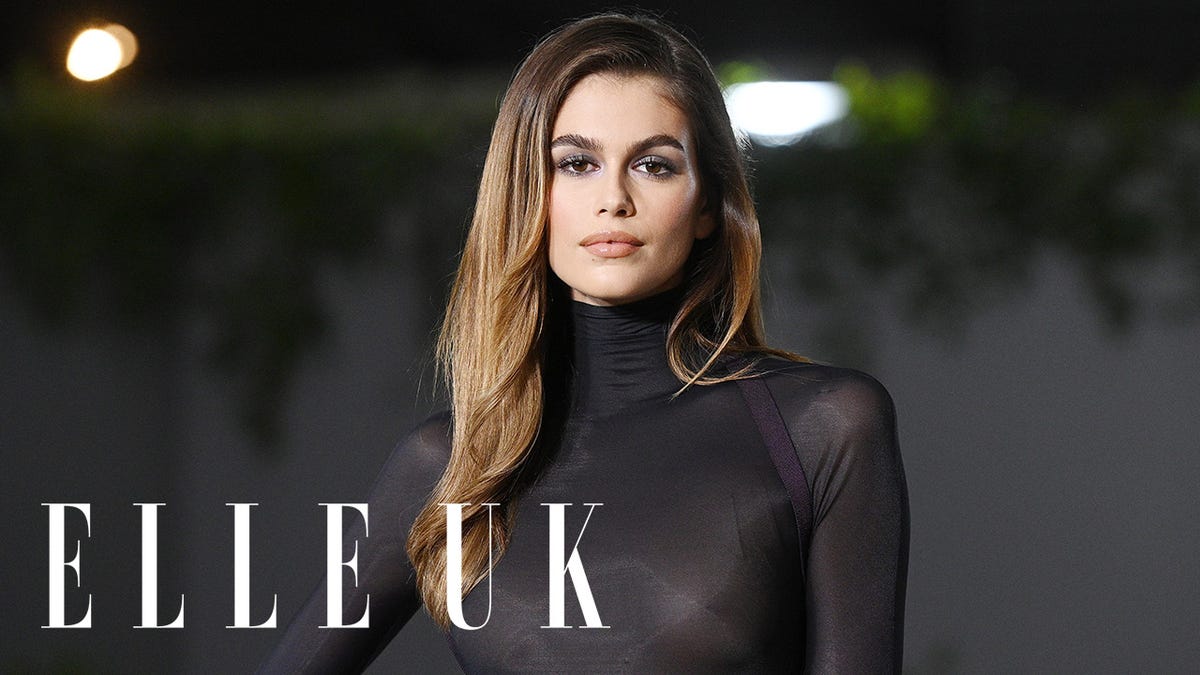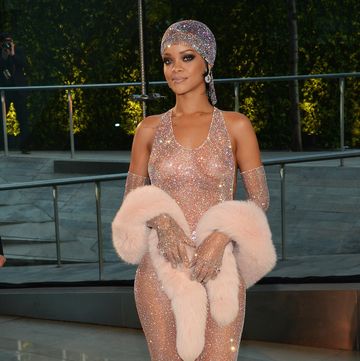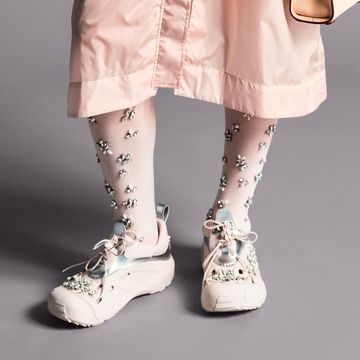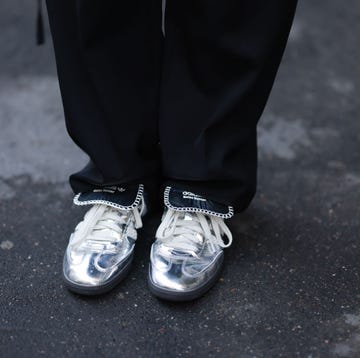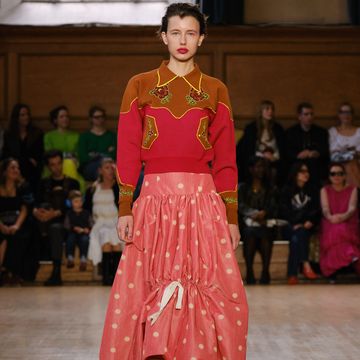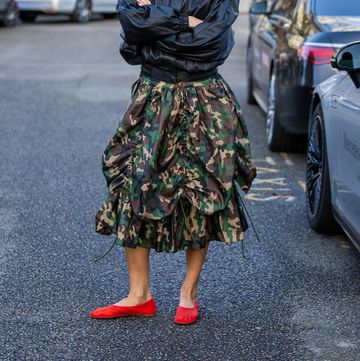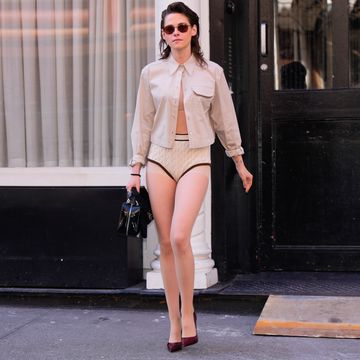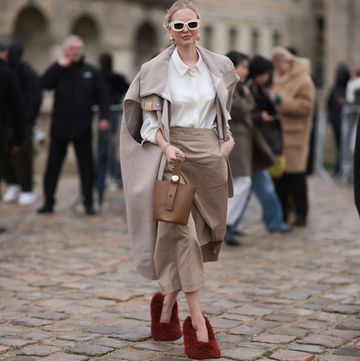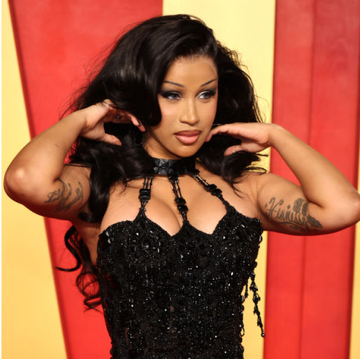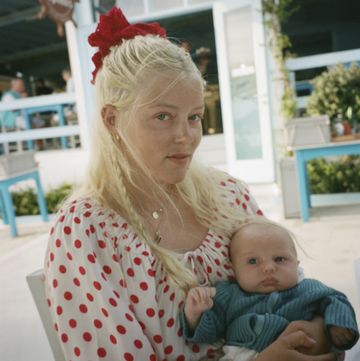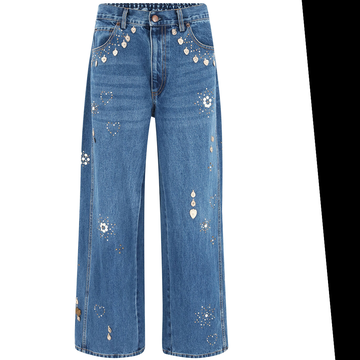It's a summer evening in Venice, California, and 27-year-old Jessica Assaf's cannabis Tupperware party is getting all fuzzy and amusing. The setting is a fragrant apartment just off Venice Boulevard, decorated with vapes, buds and tinctures, as well as some silver balloons spelling 'weed'. The snacks include sugar-snap peas with a marijuana-miso dipping sauce. And draped around the room are four bright, young entrepreneurs who are keen to tell me why cannabis is a woman's best friend.
'Across all industries, the highest proportion of female executives [is] in cannabis,' says Laura Albers, 37, head of research at Cannabis Feminist, the Tupperware-party group of ganja-smoking women who aim to disrupt the traditional cannabis distribution model and bring it into homes, a bit like Avon cosmetics. 'It's an opportunity to build an industry from scratch, up from the ground, to our standards.' Laura is on to something about the number of women holding the most senior positions in the cannabis industry, which is at 36% compared to the US average of 22% across all industries*.
'We are not your stereotypical lazy stoners,' adds Molly Peckler, 32, founder of Highly Devoted, a cannabis matchmaking service that offers weed-dating nights. 'We're smart and driven, motivated and passionate.' Emily O'Brien, 27, the inventor of Mondo, a coconut oil and cacaobased cannabis edible, explains that the cannabis plants they use are female: 'You don't want the male plants to come into contact with the female plants, otherwise they pollinate and stop producing the flowers.'
'Really, at the core of this community is a shared love of cannabis, which is why we've all dropped everything to pursue this,' adds Cannabis Feminist founder Jessica, who has been presiding over meetings like this one for a few months now. 'The power is so palpable. It's high-vibrational. I don't even know if I've smoked sometimes, I'm so high on the vibes…' 'It resonates,' says Emily. 'It's magnetic!' adds Laura. Everyone collapses laughing. 'Sorry,' says Laura. 'I hit a bong right before you walked in…'
Many people have long smoked cannabis for a variety of reasons: recreational, creative, medicinal, and a mixture of all three. However, it's only recently that cannabis has lost its associations with low aspiration and a high capacity to eat an entire box of cereal, instead becoming an accoutrement to a successful and chic lifestyle. As Los Angeles' cannabis entrepreneurs attest, it is not merely a means of getting high (although they do celebrate that aspect): it's a gourmet ingredient, a miracle beauty product, a sex aid, a bonding experience, and apparently a remedy for everything from inflammation to depression, glaucoma to menstrual cramps.
The fashion world has been going through something of a love affair with it, too. Ganja featured in Alexander Wang's AW16 collection; Jeremy Scott green-washed the adidas logo in 2012 (rapper A$AP Rocky and singer Sky Ferreira were pictured wearing the cult jumper); designer Mara Hoffman used the leaf as a print for her SS15 show, while jeweller Jacquie Aiche created a bud-emblazoned collection (models Kendall Jenner and Gigi Hadid went to the launch party). 'People are less afraid to wear my collection,' says Jacquie. 'The more normalised cannabis becomes, the more luxury products [that] are emerging for this community of professional stoners.' It was only a matter of time before Vetements created a weed-grinder necklace.
Sheherazade Goldsmith, 43, co-founder of the jewellery brand Loquet London, is another designer influenced by the marijuana leaf. 'To me, it's a symbol of revolution and change. Never have we needed that more than now,' she says, although she is keen to stress the drug's potential dangers when it is illegally produced.
Over in New York, 'edibles' – food with weed added – have become a fixture on the art party circuit. April Hunt, who works in art PR, has been to events initiated by the artist and musician Benjamin Bronfman, a big advocate of cannabis legalisation, where 'infused foods' are served to a creative set: 'The energy at these events is so good; it's such a different vibe to what you would get at a normal party. It's very intimate, everyone's having great conversations.'
The weed-infused food, meticulously prepared by big-name chefs, is presented in a sophisticated way so guests don't wolf it down for a quick high: 'At the last event, the chef served oysters with a mignonette sauce that was infused with cannabis, and prosecco cocktails infused with [the] herb.'
You can pontificate on why cannabis is the right drug for this particular moment: it's green (like kale!), it helps you relax (we all need a bit of that). But, really, there is a simple driver behind all this: the beginning of the end of marijuana prohibition in the US, and notably in California, which is experiencing a 'green rush' as the state prepares for full legalisation and regulation of cannabis.
In June 2017, National Geographic Traveller reported that Los Angeles is now the centre of an industry that's expected to be worth £17bn by 2020. In February 2017, Forbes said the legal cannabis market will create more than a quarter of a million jobs by this time. Other research suggests a growing market of consumers, too: a recent study showed that between 2002 and 2014, the percentage of Americans who said they smoked marijuana at least once in the previous year grew from 21.9 million to 31.9 million, while the number of people who used it on a daily or neardaily basis more than doubled, from 3.9 million to 8.4 million**.
Medicinal marijuana is now legal (with various restrictions) in 29 US states. In November 2016, California voted to legalise recreational marijuana, too, joining eight states where you can smoke weed just for fun. Colorado was the trailblazer here: in 2014, it licensed recreational cannabis stores, regulating the drug 'from seed to sale' and showing the world what the end of marijuana prohibition might look like.
California is on a different scale. It has a population of more than 39 million people. It's the centre of the technology and entertainment industries, and it's increasingly becoming an important fashion capital in its own right. And its inhabitants are good at marketing themselves as the wellspring of all aspirational lifestyles and wellness trends; remember, people once thought that yoga, home computers, green juice and psychotherapy were strange, Californian fads, too.
All the women at the Cannabis Feminist party acknowledge that they are in a privileged position as white female marijuana users in one of the US's most liberal states. 'We've been so lucky because of who we are. We have to make this an issue,' says Laura. They all believe the alcohol, pharmaceutical and private-prison industries are opposed to cannabis for cynical reasons. And there are more evident contradictions: banks frequently refuse to give credit to marijuana startups; medicinal dispensaries (the sometimes-legal weed 'pharmacies' that can openly sell marijuana, dependent on the state they're in, to ID-carrying members of the public) deal in cash, which means they're often held up.
The dispensaries I've visited in California are often quite sad and intimidating places – somewhere between legitimate doctors' surgeries and haunted houses. The creepiness of the dispensary experience is one of the reasons that Jessica says she wants to change how and where people use marijuana.
In the UK, cannabis is a class-B substance and possession can get you up to five years in prison and an unlimited fine. Jeremy Corbyn is in favour of allowing it for medicinal use, but only the Liberal Democrats and the Green Party believe in full legalisation. Still, on the London fashion circuit, people are drinking less and choosing to smoke marijuana instead as a way of release. According to one London-based stylist: 'I have friends who would say, "I'm on a detox from alcohol, but we'll get stoned instead."'
Similarly, a well-known fashion-set designer who lives and works in the capital tells me, 'I used to smoke it on and off until recently discovering hash oil. Someone was talking about it on a photoshoot and suggested I give it a go. A couple of drops in a warm drink is very relaxing and can be a lot of fun in social situations. For me, it offers a great alternative to the slurring, booze-fuelled nights of drinking alcohol.'
Beboe is a Los Angeles-based startup that aims to become the 'Hermès of marijuana' with its sativa (part of the cannabis genus) pastilles and its gold, £47 vaporiser pen. It was co-founded by Clement Kwan, whose CV includes spells at Dolce & Gabbana in Milan and a presidential role at online retailer YOOX. Clement learned how to grow marijuana while he was studying corporate finance at University of California Berkeley; at the height of his activities, he was harvesting 20lb per month.
'It killed me when I had to give it up when I became a banker,' he says. But after years in the corporate world, he decided to return to his first love. Clement's business partner and chief designer is Scott Campbell, the tattoo artist (and husband of actor Lake Bell). 'He's pretty much tattooed the whole of Hollywood, plus he's collaborated with Louis Vuitton and Marc Jacobs,' adds Clement.
'The plan was to build something beautiful, because if we build something beautiful and make it a relatively low dose, we'll attract a much more sophisticated consumer. Once we have that sophisticated consumer, we can use that as a platform for advocacy.' By advocacy, he means people who talk about cannabis in a way that might shift public opinion in favour of more freedom: 'We had Sharon Stone, Orlando Bloom and Justin Theroux at our launch party.'
Rihanna has never been shy about her fondness for weed, and named her latest collaboration with Manolo Blahnik 'So Stoned' – which no doubt works on a number of levels! Snoop Dogg has, however, launched his own line of products, Leafs by Snoop. Still, it's early days. To get a sense of how far all this has come, you just need to spend some time marvelling at Cheryl Shuman, the supremely glamorous and well-connected founder of the Beverly Hills Cannabis Club, which has seen Whoopi Goldberg, Drew Barrymore and Cameron Diaz pass through before now.
Cheryl, also known as 'marijuana mom', has the sort of trajectory Meryl Streep ought to play on film some day. She spent the Eighties and Nineties as 'optician to the stars', attending the ocular needs of Tom Cruise and Julia Roberts on set, while hawking diamond-encrusted eyewear on QVC. In 1995, she suffered an assault that left her traumatised, depressed and taking eight pills a day, including Xanax and Prozac. After months of fruitless counselling, her therapist finally said to her: 'Lady, I don't know how you're going to take this, but you need to smoke a joint.' He took her to his garden and she had an epiphany.
'I laughed and laughed for the first time in I don't know how long,' she says. And when she told her high-powered friends back in Beverly Hills, they all wanted some of what she was smoking, too. Before long, she was running a 2,000-strong gardening and patient collective where people could legally exchange medicinal marijuana, overseeing a 68-acre marijuana farm in Northern California and campaigning for the end of prohibition.
'[Marijuana] got a bad reputation among some powerful people at about the same time as alcohol was being prohibited,' she explains. 'It's really a cute plant that can heal a multitude of illnesses.' Cheryl, who has been involved in the launch of more than 1,700 cannabis products, had a number of key insights. The first was that she could make it an aspirational product: 'Cannabis today is very similar to fine wine. You can buy $3.99 store-brand champagne, or you can buy Cristal. They're both wines, but there's a huge difference.' And the second was that the future of cannabis was female: 'I realised women are the key to this whole thing. Women take care of most of the family's purchasing and medical decisions. If we can get women on board, we can start a revolution.'
The women in the Cannabis Feminist circle all agree that the image of the stoner 'bro' surrounded by pizza boxes and Xbox games is outmoded (even if there are twice as many male smokers as there are female ones in the US*). Founder Jessica maintains that women have always smoked weed, they just need to come out of the closet: 'Women have been scared to be open about their love for it. It's like your naughty little secret.'
Jessica pitches cannabis in a light that's more than just a way of getting high. Cannabis, as they see it, is a wellness product ideally suited to women (not least because it's excellent for PMT). They're not particularly down with 'green crack', the super-strength skunk that's grown hydroponically (without soil) in warehouses downtown. Their vibe is more 'sun-grown cannabis' from the farmers' markets in Malibu, where there's a lot of wine-like talk of 'terroir' and 'varietals'.
The uses are inventive: Cannabis Feminist's Jessica, who used to work in the beauty industry, is developing a facial oil. Then there's the array of edibles: Emily's Mondo powder comes in a chic little jar with gold lettering. It actually makes a virtue of the taste of cannabis, it's easy to use – 'Add to yoghurt parfaits' suggests the label – and it gives you a gentle and controllable high. In addition to Molly's matchmaking nights, she's moving into products: 'I'm doing this cannabis experience in a box for couples to share over sex. Hopefully it will expand into a whole range of things.'
Among the items is Foria, a cannabis lubricant for women. 'It's not a psychotropic product,' says Jessica. 'It literally just gets your vagina high. It's more intense – I feel like it makes it easier to have an orgasm.' Everyone laughs (again), but they're also deadly serious. 'This helps so many people.
In markets where they have a robust medical marijuana programme, opioid overdoses go down. Car accidents go down as fewer people drink. Tax revenues go up. This plant was made for us. We should be consuming it,' says Molly. 'We're on the right side of history here.'
Visit Talktofrank.com for confidential drugs advice
This article was originally published in the September issue of ELLE
